Can Eyes Reveal The Truth About Bipolar Disorder
Many people search for “bipolar eyes” or wonder what manic or depressive eyes look like. It’s a common curiosity: can the eyes reveal shifts in mood even before a full episode becomes obvious? This article explores what eye changes may appear during mania or depression, why people associate them with bipolar disorder, and why these traits are not reliable diagnostic markers.

What Are Bipolar Eyes? (Myth vs Reality)
Is there such a thing as having bipolar eyes? At the root of this question is the desire for a clear, external marker, a signal that could confirm whether someone is entering mania or depression. I understand that search. When my own symptoms were confusing and overwhelming, I longed for anything that could offer clarity.
This article dives into general tendencies in the eyes during mood episodes; however, I cannot say these patterns offer any true hallmarks. Even lifestyle medical writers acknowledge that evidence for “bipolar eyes” is inconclusive. I have not found reputable medical journals documenting the phenomenon. And in my own years of working with psychiatrists, not one ever examined my eyes as part of assessing mania or depression.
So my position remains: “bipolar eyes” are a myth. Certain eye changes may accompany mood states, but they’re not universal, not diagnostic, and not exclusive to bipolar disorder.
For deeper guidance on bipolar disorder, you’re welcome to explore our book or masterclass.
Why People Think the Eyes Change During Mood Episodes
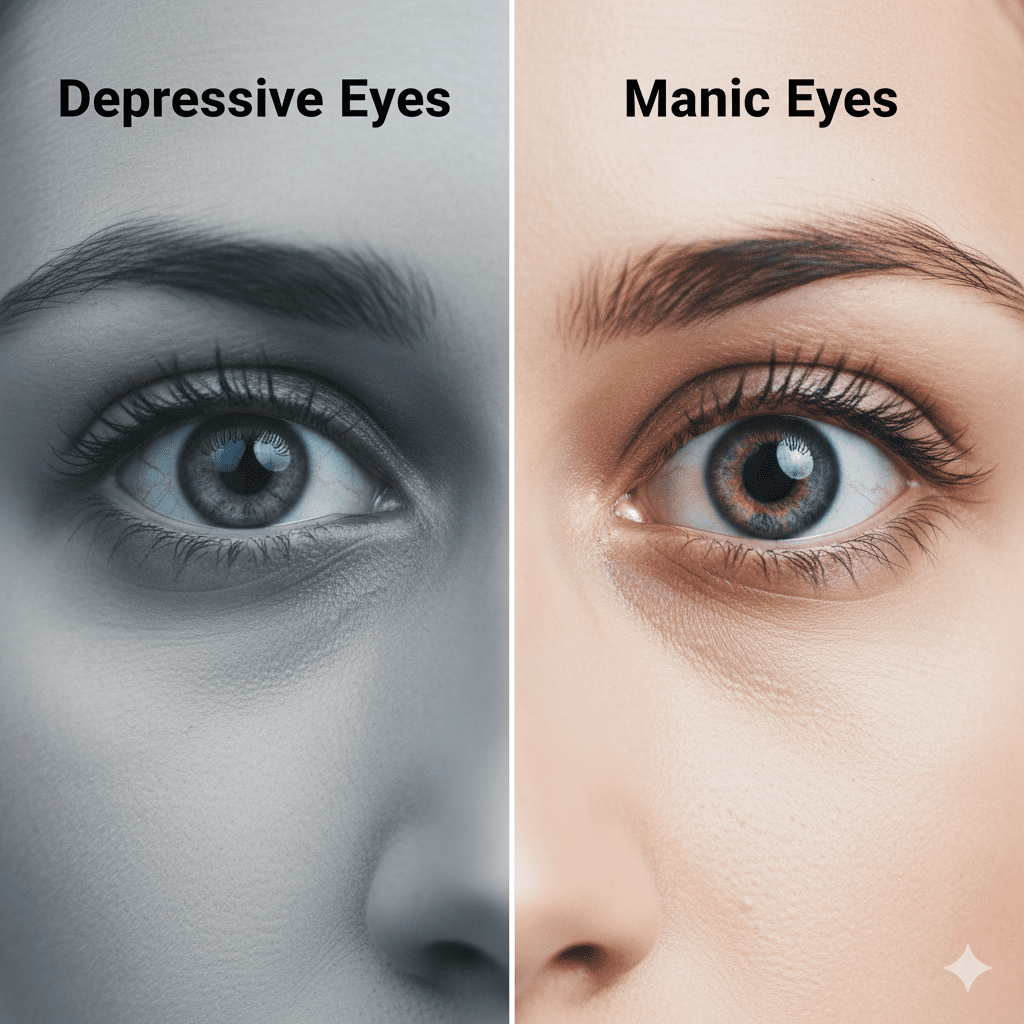
People naturally look to the eyes because they reflect emotion, sleep, and stress. When moods swing dramatically, it makes sense to wonder whether eyes could provide a visual clue, especially for loved ones trying to understand what’s happening.
But in reality, many factors unrelated to bipolar disorder can influence how our eyes look, including lighting, fatigue, anxiety, and physical health.
General Eye Characteristics during Depression
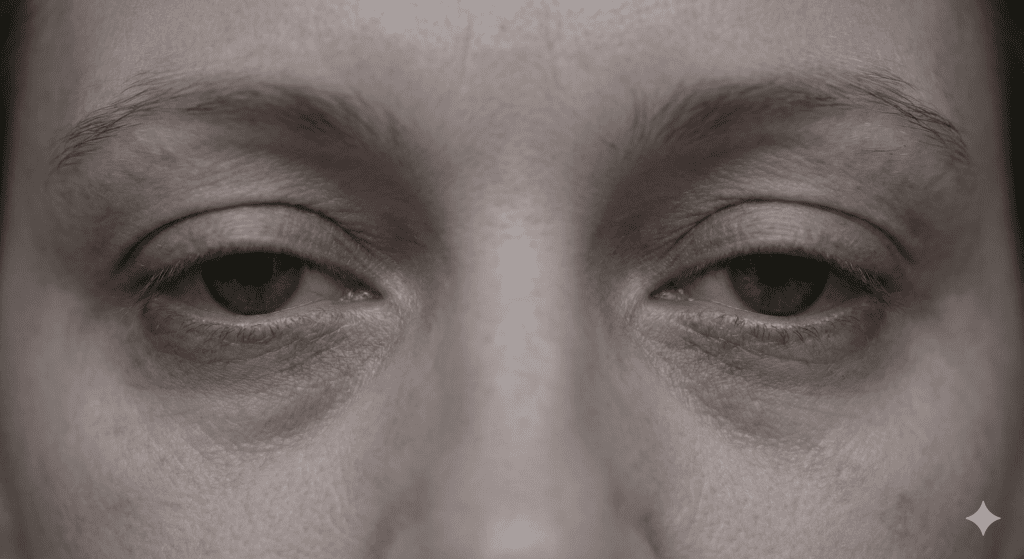
Bipolar depression is an intensely personal, complex experience. My own episodes brought brain fog, poor memory, migraines, feelings of worthlessness, anxiety, and suicidal ideation. Others describe a loss of appetite, asexuality, drained energy, or a sense of profound nothingness.
Here are general eye-related tendencies some people notice during depressive episodes. These are descriptive, not diagnostic and based on lived experience and common patterns.
Avoiding Eye Contact
Deep inner turmoil often leads to avoiding eye contact. I’ve avoided looking at others because it felt like my eyes would reveal the storm inside. Shame and worthlessness frequently play a role.
Looking Downward
Depression can make the entire body feel heavy. The gaze naturally drops, matching the inward-turning posture. Even lifting the eyes can feel like effort.
Blank Stare
Rumination often traps a person in looping, negative thoughts. I’ve found myself staring into space for long stretches, not focused on anything outside, but lost entirely in my own mind.
Physical Symptoms Due to Poor Sleep
Depression and insomnia often go hand in hand. Common eye-area changes include:
Dark circles — often tied to disrupted sleep
A hollow appearance under the eyelids — connected to fatigue
Visible blood vessels — strain and poor rest make them more pronounced
An aged or tired appearance — general exhaustion reflected in the face
Puffiness or bags — fluid retention from poor sleep
Squinted eyes — which, for me, sometimes accompanied migraines
These traits are common in many conditions, not exclusive to bipolar depression.
For more in-depth, guidance on bipolar disorder, consider purchasing our book or masterclass to support us.
General Eye Characteristics during Mania
Mania affects the body in vivid, sometimes overwhelming ways. And while I maintain that there’s no such thing as true “manic eyes”, certain eye expressions can accompany the emotional and physical intensity of a manic state.
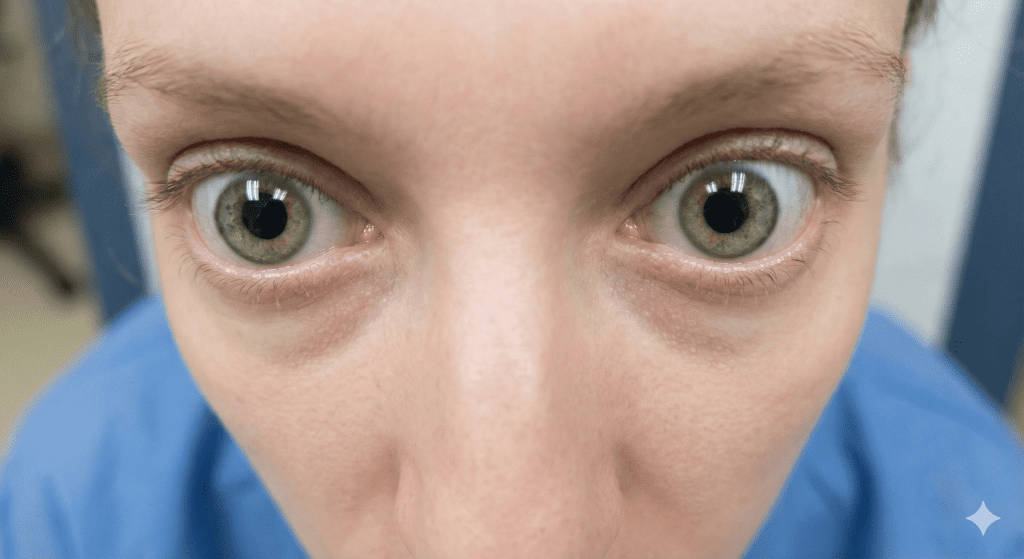
Dilated Pupils
During mania, adrenaline surges, sleep decreases, and energy spikes, all of which can cause pupils to dilate. Substance use or intense anger can also play a role. However, dilated pupils are not proof of mania.
“Sparkling” Eyes or an Over-Bright Expression
Mania can make the world feel fascinating, electrifying, and full of possibility. I’ve felt that pleasurable tingling in the brain, the sense that everything is vivid and meaningful. That inner intensity sometimes shows in the eyes as a bright, wide, or “liquid” appearance. Loved ones may find this unsettling.
Eyes Appearing Darker or “Black”
I’ve seen anecdotal reports from others describing eyes turning black during mania. I want to be clear: I’ve found no medical evidence for actual color change. What’s more likely is extremely dilated pupils or lighting effects that make the eyes look darker.
Again, this does not mean someone is manic simply because their eyes look different.
Other Reasons Eye Appearance Can Change (Not Bipolar)
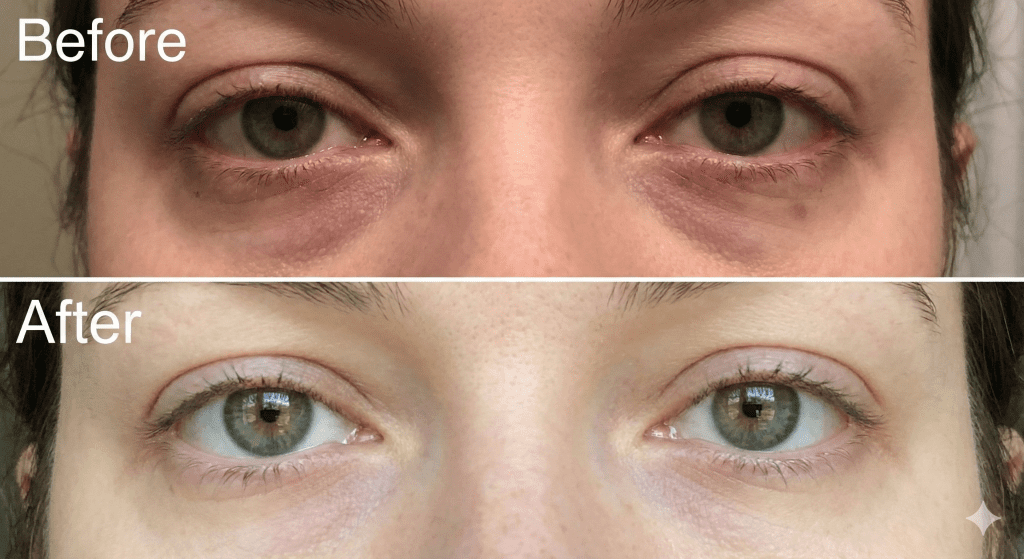
Many eye changes associated with bipolar episodes also appear in:
Sleep deprivation
Anxiety or panic
Migraine
Substance effects
Sinus pressure or allergies
Dim or bright lighting
Simple variations in emotion
This overlap makes it difficult to attribute eye changes exclusively to bipolar disorder.
Understanding it All
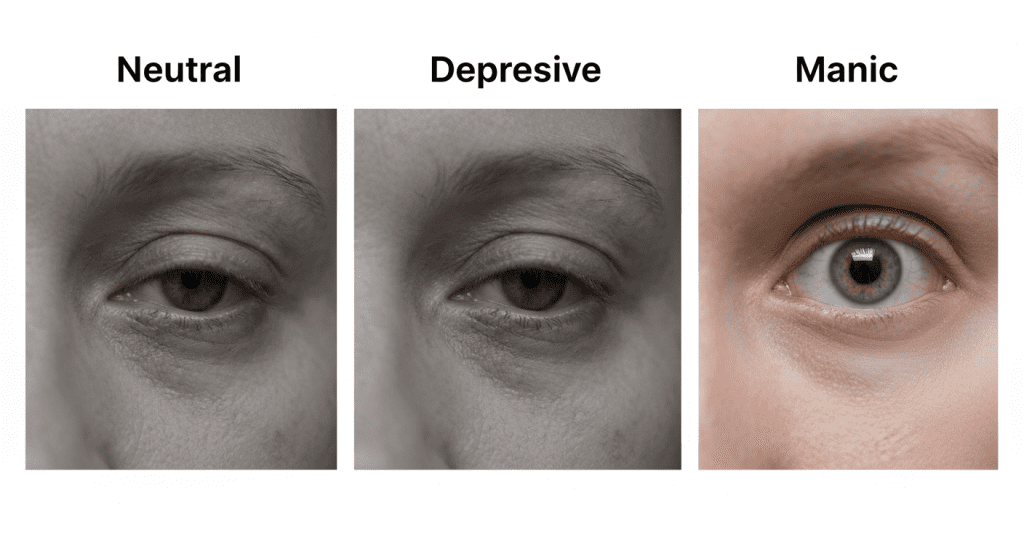
If some of the descriptions of bipolar eyes, manic eyes, or depressive eyes resonate with you, that’s completely valid. Eye expression can shift during mood changes because the eyes often mirror what’s happening internally, emotionally, physically, and physiologically.
However, the science does not support the idea that the eyes alone can diagnose bipolar disorder. They are clues, not conclusions.
If you or a loved one notice consistent patterns, write them down. Patterns, over time, can be helpful to share with a qualified mental health professional. But if your doctor doesn’t give these eye changes much weight, trust your intuition: use them as signals, not certainties, as you learn how to maintain balance.
For more in-depth guidance on bipolar disorder, consider supporting us through our book or masterclass.
For more, in depth, guidance on bipolar disorder, consider purchasing our book or masterclass to support us.
FAQ About Bipolar Eyes and Mood-Related Eye Changes
Are “bipolar eyes” real?
Not as a diagnostic marker. Eye changes can reflect emotion, sleep, and stress, but they cannot confirm bipolar disorder.
What do manic eyes look like?
Some people describe wide eyes, dilated pupils, or an intense, bright expression during mania. These are not universal.
What do depressed eyes look like?
Downward gaze, avoidance of eye contact, or a blank stare are common, often tied to rumination and emotional heaviness.
Do eyes change color during bipolar episodes?
There’s no medical evidence that eye color changes. Dilated pupils can make eyes look darker.
Why do pupils dilate during mania?
Adrenaline, lack of sleep, heightened emotion, and overstimulation can all contribute—but none are exclusive to mania.


